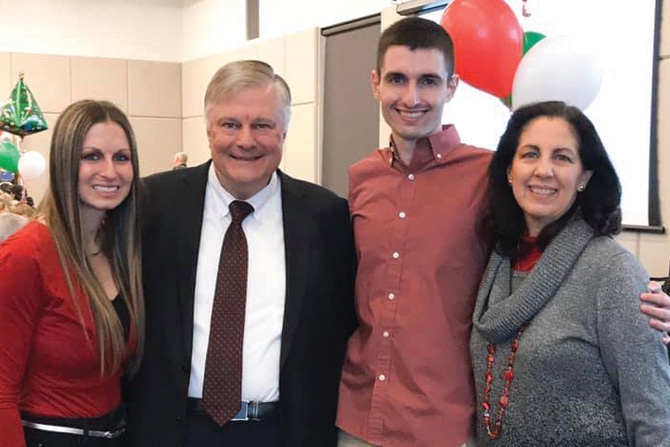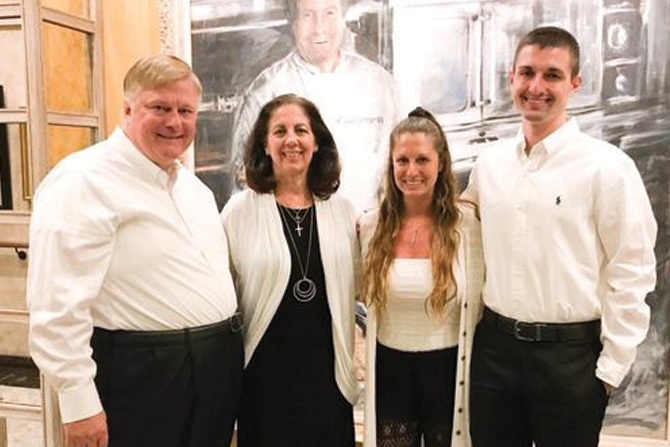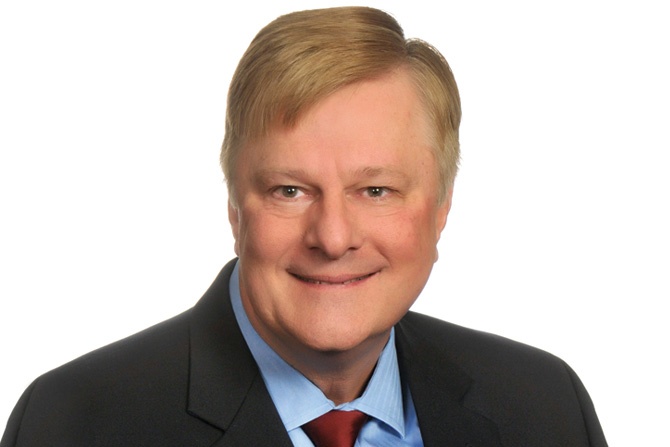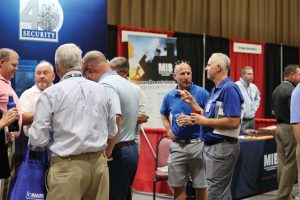Would you please tell us about growing up in Independence, Missouri?
I was very fortunate to have a great experience growing up. While Independence had a population of about 100,000, it felt like a small town. My family lived in town, but they owned farmland and my grandparents and extended family all farmed. I spent a lot of time in the country. My parents were both educators. My father was the former basketball coach at the high school I attended and was an administrator in the school district in addition to teaching drivers’ education. My mother taught home economics in another high school in Independence.
Growing up, I played a lot of sports. We had a YMCA in town, and I took advantage of a lot of their programs. I swam competitively through college.
Most people know that President Truman lived in Independence. I remember seeing him walking past our elementary school with his Secret Service agent almost every day. We would also see him eating in small restaurants around town. No one bothered him when he was out. It was a different time. I also remember seeing President Nixon come to his house for a visit.
Why did you go into banking?
It wasn’t a grand, well-thought-out plan. George Lehr was an adjunct professor at William Jewell my junior year. He was also the chairman of the board and CEO of Traders Bank of Kansas City. He asked me what I was going to do during the summer after the spring semester, and I told him I was going to haul hay and paint barns. He offered me a bank job instead. The only question I asked before agreeing to accept the job was, “You’re going to pay me to sit in air conditioning?” I didn’t even ask him how much I would make.
That was the summer of 1980. It was over 100 degrees for 15 days in a row that year. I think the good lord must have been looking out for me.
That summer at the bank, I did a little bit of everything, such as proof and transit and working as a teller. It went well, and that was the beginning.
Why did you double-major in business administration and economics at William Jewell College?
I had some exposure to small business from being around our family farm. My cousin and I also had a cow-calf herd that we built up over the years. I had also purchased and leased out some real estate while in college. At the time, I didn’t think anything about the lessons I learned by doing those things. But I was able to see what I learned in business and economics classes could be applied to real life.
What did your college and university experiences teach you about banking?
The classes I took in college laid the building blocks for my career in banking. They taught me how to understand accounting, marketing, banking, etc., from a theoretical viewpoint. Some of the classes I took at William Jewell were even taught by bankers like Larry Janacaro, Frank McCarthy and George Lehr. They tended to bring the theoretical information into real-life situations. It was a special opportunity.
Maybe some of the more important lessons were learned outside the classroom. Being involved in a fraternity and helping run the business side was a big part of my college experience. College also exposed me to a lot of people who had different backgrounds, cultures and beliefs.
When I decided to attend graduate school, I went to Rockhurst College at night and on the weekends. It seemed like every class I took was something I could apply to my job at the time.
How has your background in economics benefited you?
A background in economics and business administration has helped me understand what our clients are facing as business owners and consumers. It has also helped me in business decisions involving the bank.
What drew you into community banking?
I like doing a variety of things, and I like to help folks. Big banks can be more like white-collar factories. You must follow the bank’s processes, and it’s difficult at times to help clients because you are limited in what you can do. I can’t always make people happy in community banking, but I can sit down with them eye to eye and help them more than I could otherwise.
How did you start working at the Community Bank of Raymore?
Bill McDaniel and his family own the bank. He and I had worked together at other banks going back to 1983 and had looked at buying a bank together, but I decided to stay where I was. We stayed in touch, though, and in 1999 he asked me whether I was ready to come back to work at a real bank. I was the National Credit Manager of Government Lending at Bank of America then. It was a good time to make a change in my life and move to Raymore. My family and my wife’s family were still in Independence, and we were happy to come back to the area. We have never regretted the decision.
I should also mention that Bill and I and a group of investors started another bank in 2006, Community Bank of Pleasant Hill. In retrospect, it was probably the worst time since the Great Depression to open a new bank. We have been successful, though, due to the great team running the bank.

There are so many people who have impacted my career, and it is impossible to name them all.
Are there any specific individuals who had a significant impact on your career? How?
There are so many people who have impacted my career, and it is impossible to name them all. George Lehr, Larry Janacaro, Gray Lewis, Jim Campbell, and Mike Brosnahan are just a few. I hope I don’t offend anyone I didn’t list.
Bill McDaniel and his family obviously gave me the opportunity here at Community Bank of Raymore and Community Bank of Pleasant Hill. I probably can’t say enough about their impact on my career and life.
What is the most rewarding part of your career?
There are probably two things that stand out when I think about the most rewarding parts of my career. First, I enjoy watching people grow and become leaders in our bank and in the community. The second thing is watching the success of our clients over time.
As bankers, we can learn a little about a lot of different businesses and people. Sometimes we can observe why someone is successful in business. On the flip side, sometimes we can observe why others are not successful.
If you look back at your career and life, what are three things you have learned that you would share with someone you are mentoring?
Get as much formal, business-related education as you can if you want to be a banker.
Get involved in your community. Most communities are starved for leadership, and there are many opportunities for service, such as the church you attend, the chamber of commerce, and the Rotary Club. I love living and working in the same community. You get to know people, and it is so rewarding.
Focus on helping people as best you can. I always say tell people what you can do and not what you can’t do.
What are your plans as the incoming MIBA president?
Our board needs to work together to figure out how to deal with the challenges we are facing as an association. We have been successful in helping community banks in Missouri compete for 62 years. We want to make sure we continue to provide what our members need now and in the future.
What are the most important issues currently facing the association?
We all know the number of banks in our state and country continues to shrink. This trend is not likely to change. It places a strain on how to properly fund our association.
On a national level, the regulatory environment poses so many threats, whether we talk about possible new reporting requirements or the threat to our franchises posed by credit unions or FinTechs.
What do you see as the benefits of MIBA membership?
The various training opportunities provided by the association are a key benefit. The exposure to new products and services through interactions with our vendors at events is another benefit. Maybe the biggest benefit is the interaction with other bankers and getting to learn from them how they are dealing with the same challenges we
are all facing.
For banks that can deal with the pandemic in a commonsense way, it may create opportunities.
Given that you are in the banking industry, what will the continuing impact of the pandemic be on banking?
COVID-19 probably won’t go away. For banks that can deal with the pandemic in a commonsense way, it may create opportunities.
I know more and more people are using online banking capabilities and working remotely. It is hard, though, to quantify what you lose by not having those face-to-face contacts.
Would you please tell us about your family?
My wife Connie is an account executive for Assured Partners in Lee’s Summit. She works in the group health insurance area.

My daughter Heather is an English teacher and cheerleading coach at Fort Osage High School in Independence, and I tip my hat to her because she is very patient to be able to do that. She was a four-year cheerleader and a team captain during her senior year at the University of Missouri.
My son Travis graduated from Truman State University and works in quality control at Bayer in Kansas City. He’s also a lieutenant in the Missouri National Guard, and at the beginning of September, he was outside New Orleans helping with the hurricane disaster recovery efforts.
My mother Hazel is still alive, and we are planning for her 101st birthday party in December. She also resides in Raymore.
Our 4-year-old German Shepherd Kianna is another big part of our family. We didn’t think we wanted another dog after losing our last German Shepherd, but that lasted six months before I got the new puppy.
What do you do in your spare time?
I love to hunt and shoot. This June, I went to South Dakota prairie dog hunting with a group of friends.
I don’t read as much as I used to, but I also love to listen to audiobooks.
Do you have a favorite book or quote?
Yes, it’s a quote by Thomas Sowell, who is an economist. In The Vision of the Anointed, he said, “One of the sad signs of our times is that we have demonized those who produce, subsidized those who refuse to produce, and canonized those who complain.”







